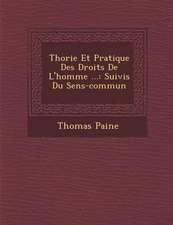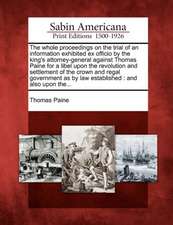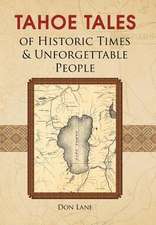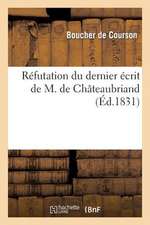Rights of Man
Autor Thomas Paineen Limba Engleză Paperback – 15 noi 2007
Preț: 246.92 lei
Nou
Puncte Express: 370
Preț estimativ în valută:
47.26€ • 51.36$ • 39.73£
47.26€ • 51.36$ • 39.73£
Carte tipărită la comandă
Livrare economică 17-23 aprilie
Preluare comenzi: 021 569.72.76
Specificații
ISBN-13: 9781408632307
ISBN-10: 1408632306
Pagini: 284
Dimensiuni: 140 x 216 x 16 mm
Greutate: 0.36 kg
Editura: Baltzell Press
ISBN-10: 1408632306
Pagini: 284
Dimensiuni: 140 x 216 x 16 mm
Greutate: 0.36 kg
Editura: Baltzell Press
Notă biografică
Thomas Paine (born Thomas Pain[1]) (February 9, 1737 [O.S. January 29, 1736]- June 8, 1809) was an English-born American political activist, philosopher, political theorist, and revolutionary. He authored the two most influential pamphlets at the start of the American Revolution and inspired the patriots in 1776 to declare independence from Great Britain.[2] His ideas reflected Enlightenment-era ideals of transnational human rights.[3] Historian Saul K. Padover described him as "a corsetmaker by trade, a journalist by profession, and a propagandist by inclination".[4] Born in Thetford in the English county of Norfolk, Paine migrated to the British American colonies in 1774 with the help of Benjamin Franklin, arriving just in time to participate in the American Revolution. Virtually every rebel read (or listened to a reading of) his powerful pamphlet Common Sense (1776), proportionally the all-time best-selling[5][6] American title, which catalysed the rebellious demand for independence from Great Britain. His The American Crisis (1776-1783) was a pro-revolutionary pamphlet series. Common Sense was so influential that John Adams said: "Without the pen of the author of Common Sense, the sword of Washington would have been raised in vain".[7] Paine lived in France for most of the 1790s, becoming deeply involved in the French Revolution. He wrote Rights of Man (1791), in part a defense of the French Revolution against its critics. His attacks on Anglo-Irish conservative writer Edmund Burke led to a trial and conviction in absentia in England in 1792 for the crime of seditious libel. The British government of William Pitt the Younger, worried by the possibility that the French Revolution might spread to England, had begun suppressing works that espoused radical philosophies. Paine's work, which advocated the right of the people to overthrow their government, was duly targeted, with a writ for his arrest issued in early 1792. Paine fled to France in September where, despite not being able to speak French, he was quickly elected to the French National Convention. The Girondists regarded him as an ally. Consequently, the Montagnards, especially Maximilien Robespierre, regarded him as an enemy. In December 1793, he was arrested and was taken to Luxembourg Prison in Paris. While in prison, he continued to work on The Age of Reason (1793-1794). James Monroe, a future President of the United States, used his diplomatic connections to get Paine released in November 1794. Paine became notorious because of his pamphlets. The Age of Reason, in which he advocated deism, promoted reason and free thought and argued against institutionalized religion in general and Christian doctrine in particular. He published the pamphlet Agrarian Justice (1797), discussing the origins of property and introduced the concept of a guaranteed minimum income through a one-time inheritance tax on landowners. In 1802, he returned to the U.S. When he died on June 8, 1809 only six people attended his funeral as he had been ostracized for his ridicule of Christianity
Descriere
Descriere de la o altă ediție sau format:
Presents an overview of Paine's career as political theorist and pamphleteer, and supplies background material to "Rights of Man". This book discusses how Paine created a language of modern politics that brought various issues to the common man and the working classes and assesses the debt owed to Paine by American and British radical traditions.
Presents an overview of Paine's career as political theorist and pamphleteer, and supplies background material to "Rights of Man". This book discusses how Paine created a language of modern politics that brought various issues to the common man and the working classes and assesses the debt owed to Paine by American and British radical traditions.
Recenzii
Claeys has done a fine job of situating Paine's famous text in the intellectual and practical context, drawing out the most important themes, and referring the reader to the best secondary literature. . . . An excellent textbook for undergraduate courses in political theory. --James Tully, McGill University
Textul de pe ultima copertă
No individual's writing better exemplifies this transformation of the language of social and political change than that of Thomas Paine (1737-1809). And no individual has a better claim to be the world's first international revolutionary. His writings bear witness to his revolutionary activities, and provide us with a detailed picture of the evolving understanding of social and political change at the end of the eighteenth century.
Cuprins
Preface to the English edition; 'Rights of Man, etc. etc.'; 'Observations on the Declaration of Rights'.





























